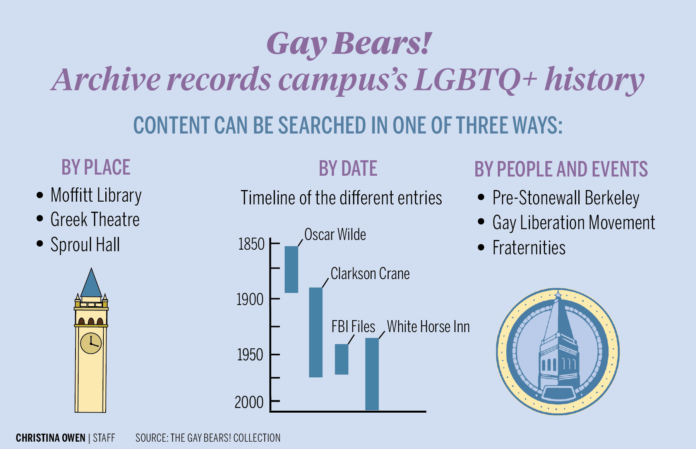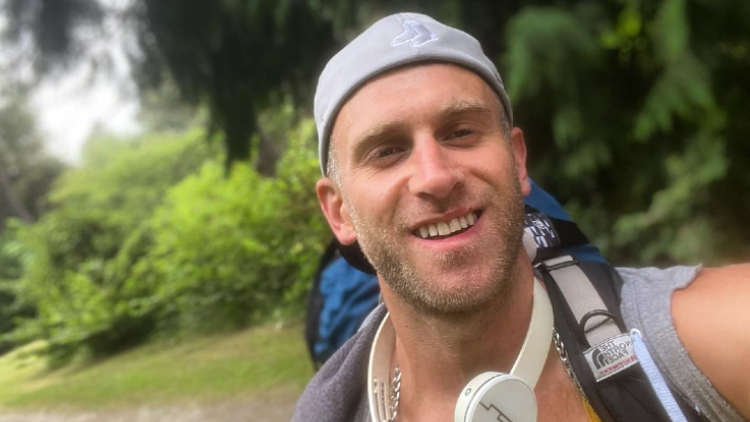
Former campus archivist William Benemann was going through the Social Protest Collection in the Bancroft Library when he came across a mimeographed form from 1970 written by campus’s Gay Student Union. The form asked former California governor Ronald Reagan to attend the first openly gay dance on campus after he told a KQED reporter that he hadn’t been invited.
This story and many others are chronicled in the Gay Bears! The Hidden History of the Berkeley Campus website, hosted on the University Archives domain. Benemann and former UC career staff member Steven Finacom spent years gathering information before creating the site together with former campus faculty Mary Scott in 2002.
“As gay men, we are particularly fascinated by the LGBTQ aspects of campus history, and for years we have e-mailed each other back and forth whenever we run across something that might be a reference to gay life at Cal,” Benemann said in an email. “We each had (physical) folders full of information we had gathered, so we divided the stories evenly.”
According to Benemann, they initially wanted to build a physical museum showcasing UC history but ran into financial difficulties.
Finacom said they also considered publishing an LGBTQ+ focused issue of a campus historical journal but finally settled on creating an independent website that could be updated with new information.
Benemann and Finacom found stories and material for the website from their own research, interviews and leads from conversations with former faculty members. All stories on the website pertain to campus’s LGBTQ+ history and are organized by people and events, dates and places.
“For today’s readers, it’s probably a bit like a collection of UC-centric Wikipedia pages,” Finacom said in an email. “Each page gives some history, some context, some references, and is, most importantly, a jumping off point for further research.”
Benemann noted that the website was never meant to be comprehensive, but rather a starting point for anyone curious about the topic.
The website features one of the earliest openly gay ASUC senators, an accomplished yet little known female philanthropist, a closeted gay Republican activist and a 1920s novel showing hidden pieces of campus life, among many other stories and artifacts.
“There is also an amusing aspect to the name of the website. “Gay Bears!” was a natural choice because it’s a play on words on the slogan, “Go Bears!”, which every Cal student knows,” Finacom said in his email. “I like to think that occasionally a gay man searching for a hook-up or affinity group might end up on our website accidently and learn something about history.”
Finacom added that he hopes users of the site recognize the continuity of history. He said for every LGBTQ+ student running for office today, there is a history of similar efforts dating back to the 1950s or 1960s.
The site contains stories up through the late 20th century, according to Finacom. He noted that there are many remaining stories about campus LGBTQ+ history not in the archives, such as the story of three gay men simultaneously writing opinion columns for The Daily Californian in the 1990s.
“I would strongly urge students to build their own website to record campus LGBTQ history and preserve current events,” Benemann said in his email. “Our site might be a good model of the types of topics that could be explored, but there is no reason to cram new stuff into an old framework.”
The site is no longer being actively updated, making it an “artifact in time,” according to Finacom. Benemann stressed, however, that the site still offers a lot to current students.
The Reagan story is one of Benemann’s favorites on the website, he added, partly because the copied invitation reminded him of his love for archives.
“A half-sheet of mimeographed paper is not something that anyone ordinarily would consider a treasure, not something that ought to be collected and preserved for posterity, but because someone back in 1970 did just that, I was able to connect in a tangible way to those gay activists sitting at a table in Sproul,” Benemann said in his email. “It was an opportunity to touch hands across time with the brothers and sisters who came before me.”
Contact Vani Suresh at [email protected], and follow her on Twitter at @vanisuresh_.








